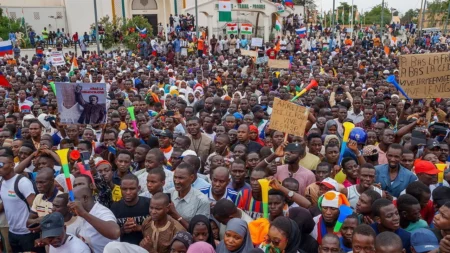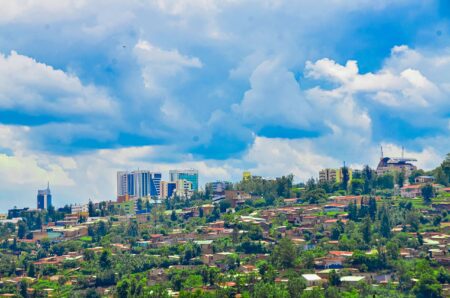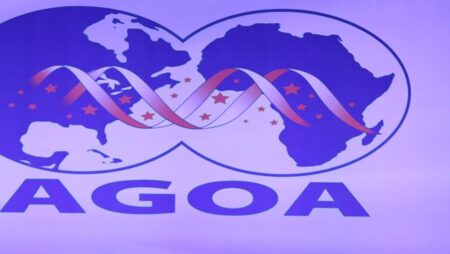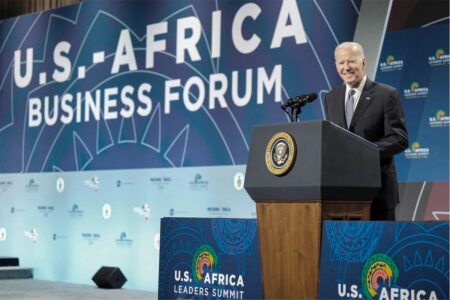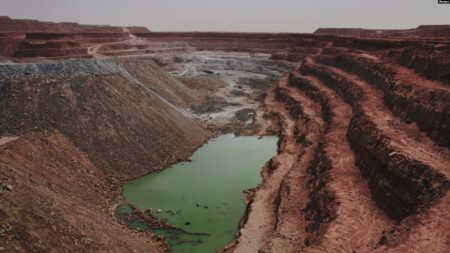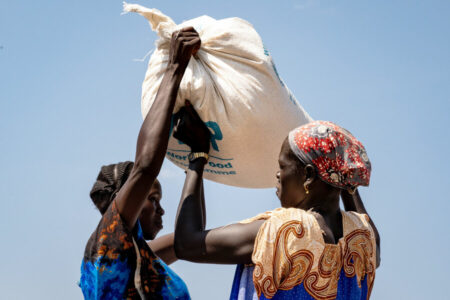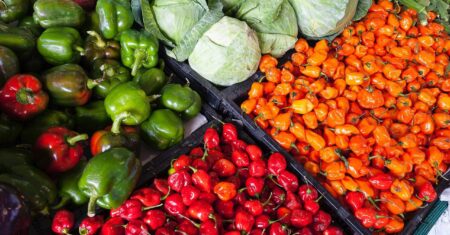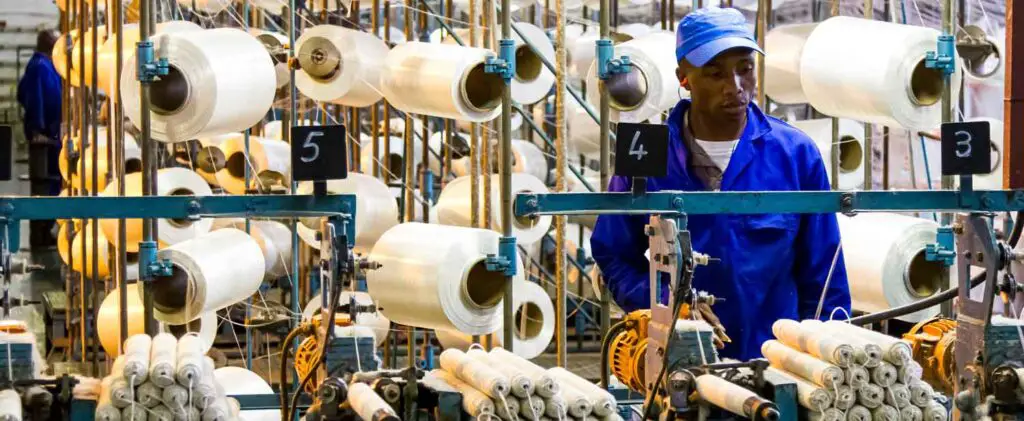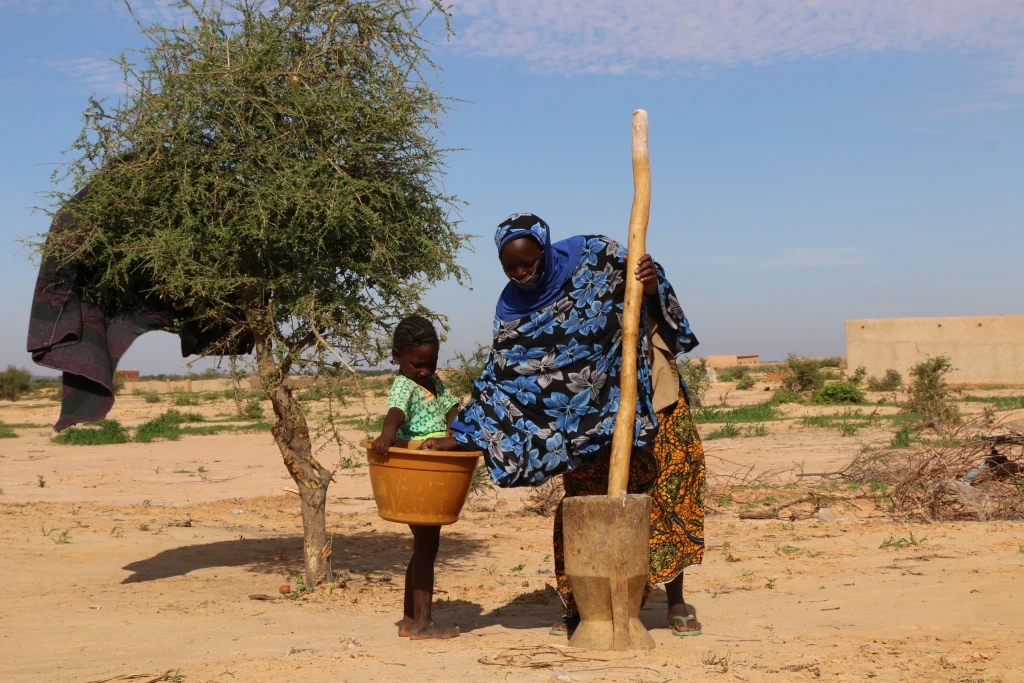- Africa’s new dawn: the rising role of digital and AI in agriculture
- Can Dangote Refinery Transform Africa Energy Ambition
- Gallup Survey: 80 per cent of Kenyan Workers Are Disengaged and Seek New Opportunities
- Madagascar Man Freed from 5KG Tumor After 15-Year Struggle
- How women in Africa are perceived and treated
- Sugar consumption in Kenya to Increase to 1.23 Million Tonnes
- Can Somalia and Turkey Oil deal Bring Change in Somaliland
- Remittances to Kenya dropped to $371.6 million in June, marking a six month low
Browsing: Niger
- Months after the Military takeover in Niger, the African Development Bank (AfDB) forecasts the country’s GDP to jump by 11.2 per cent in 2024, following growth of 4.3 per cent in 2023.
- Niger has removed its military support agreements with the French and the US, respectively.
- Niger becomes the third country, following Mali and Burkina Faso, to experience a military takeover.
Growth projections after the Military takeover in Niger
“Imperialist France”, “Down with France”, and “Chani (name of the Niger coup leader)” are a few energetic words chanted by the thousands of supporters and demonstrators who demanded the French troops leave Niger.
The latter reflects what is now referred to by the military regime as a people-led democracy. The question that then arises is; Could Africa be experiencing a withdrawal period from the grim historical chains of its colonial era, particularly the Francophone nations, Niger to be exact? (colburnschool.edu…
Africa will be the second fastest-growing regional economy in 2024. Over 10 African countries will experience substantial GDP growth. In October 2024, the International Monetary Fund emphasized Africa’s pivotal role in global economic development and resilience.
Africa could face economic headwinds this year. However, some of the continent’s brightest spots are lighting up the economic prospects. According to the International Monetary Fund, six of the top 10 performing nations globally are projected to come from Africa in 2024.…
United States officials and politicians have shown much interest and support for renewing the African Growth and Opportunity Act (AGOA) as its expiration date approaches in September 2025. The fate of this landmark legislation, which provides duty-free access to the US markets for some African countries, remains uncertain for the next 22 months but has significant implications for trade between the United States and Africa.…
Four African countries are staring at huge losses running into billions of dollars starting January 2024 following their expulsion from the African Growth and Opportunity Act (AGOA). The move will further worsen the unemployment crisis in the affected countries. Agoa offers thousands of jobs in apparels industry, especially to the youth.…
- China signs deal to reopen closed uranium mining site in crisis-hit Niger.
- Niger further agrees to give Chinese Company an oil pipeline deal.
- China to build an industrial park for manufacturing, real estate, mining.
China has signed a deal with troubled West African nation of Niger for the reopening of a controversial uranium mining site. Before China, there was France, and now the question is, will Chinese leave Niger in a better condition than the Frenchmen?
China is actually looking to score a broad-based investment deal that will include the construction of an industrial park, and an oil pipeline among other investments. The industrial park is also to be the site for the development of the uranium mine in question or maybe a site for enrichment, the details of the deal are not yet clear.
Niger China uranium mining
Jiang Feng, the Chinese ambassador to Niger, made the revelations recently. …
- Niger military overthrows the democratic government led by President Mohamed Bazoum.
- Niger’s Colonel-Major Amadou Abdramane announces coup d’état on national television.
- This is the seventh coup in the West African region in just three years.
In Niger coup d’état, the ouster of the government of President Mohamed Bazoum might plunge the West African country’s economic wellbeing into jeopardy.
Late on Wednesday, June 26th, a group of soldiers took over the national television in Niger and announced the removal of President Mohamed Bazoum from power. Earlier, they had held the president in the presidential palace. Colonel Amadou Abdramane, surrounded by nine other officers, read a statement explaining that the defence and security forces made this decision to put an end to the existing regime, citing the deteriorating security situation and governance issues as reasons.
President held in Niger coup d’état
“The defense and security forces… have decided to put an …
- In West Africa, half of the 11.6 million individuals, who were set to receive food aid between June to August, will not get any support.
- Only about 6.2 million people will get support. They are mainly refugees, displaced individuals, malnourished children under the age of 5, pregnant and breastfeeding women, and girls.
- Populations at risk as spread across Burkina Faso, Chad, Central African Republic, Cameroon, Mali, Mauritania, Niger, and north-eastern Nigeria.
Millions of people grappling with West Africa’s hunger crisis will not receive emergency assistance between June and September due to limited funding. According to the World Food Programme (WFP), almost half of the 11.6 million individuals, who were set to receive food aid between June to August, will not get any assistance.
The shock revelation comes as WFP and authorities in the Sahel region struggle with the worst hunger crisis in 10 years.
Populations in Mali and Chad will …
According to the Central Bank of West African States (BCEAO), growth should accelerate in the WAEMU economic region in the medium term. The increased production in the tertiary and secondary sectors remains crucial. These sectors should benefit from controlling the current health crisis in the Union and the continued implementation of the NDPs.
Growth in the Union is expected to drop from 6 per cent in 2021 to 5.9 per cent in 2022 before settling at 7.2 per cent in 2023. The contribution to growth from the tertiary sector should stand at 3.5 per cent in 2023, up by 0.3 points compared to 2022. The contribution of the secondary sector should grow by 0.9 points between the two years to settle at 2.6 per cent in 2023.…
A recent index report showed that Tanzania’s agro sector is mechanizing rapidly on the back drop of value addition mini-factories, the revolution is not unique to Tanzania, it is happening continent wide and North Africa is leading.
Evidence to this fact lies in the pages of the Africa Industrialization Index (AII) report that show more than 35 of Africa’s 52 countries have become more industrialized over the span of the last decade.
The multi-stakeholder report, prepared by the African Development Bank, the African Union and the United Nations Industrial Development Organization (UNIDO), attests to an ongoing industrial revolution in Africa.
The Africa Industrialization Index (AII) uses 19 indicators to rate each country’s level of industrialization ranging from performance of its manufacturing sector, capital, labor to a country’s business environment, its infrastructure and even its entire macroeconomic status.…
-
- The Nigerien Authorities and the Staff of the International Monetary Fund (IMF) have reached an agreement at the staff level on the first review of Niger’s economic programme under the Extended Credit Facility (ECF)
- This year’s growth is anticipated to pick up to a healthy 6.9 per cent from where it was at the beginning of the year
- To foster robust and inclusive economic growth, it is more important than ever to maintain the execution of reforms to increase domestic tax mobilisation, the quality of public expenditure, openness, and the fight against corruption
Niger is receiving approximately US$276 million over the course of a three-year. The loan was granted by the International Monetary Fund (IMF) in December. This loan is intended to assist Niger in recovering from the consequences of the Covid-19 pandemic.
According to a statement released by the IMF on Tuesday, The International Monetary Fund (IMF) and Niger





